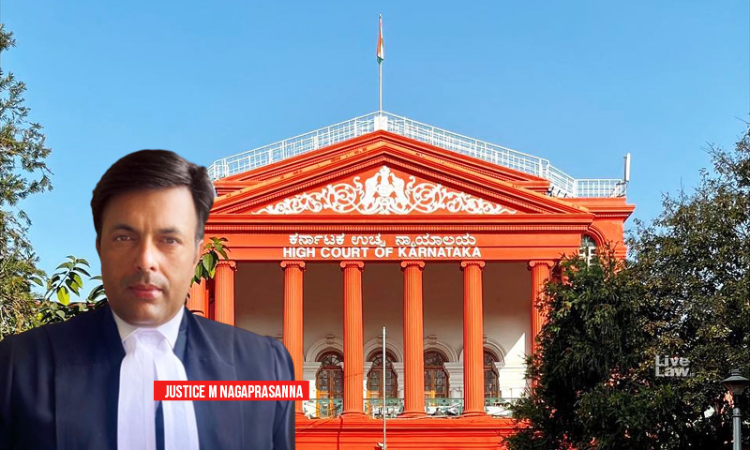- Home
- /
- High Courts
- /
- Karnataka High Court
- /
- Prior Approval U/S 17A Of PC Act...
Prior Approval U/S 17A Of PC Act Cannot Be Bypassed By Only Projecting Offence Under IPC While Filing FIR: Karnataka HC
Mustafa Plumber
12 May 2025 4:35 PM IST
The Karnataka High Court has quashed a criminal case registered against former Member of Legislative Council (MLC) D S Veeraiah, who was accused of misappropriation of Rs 47.1 crore from the D Devaraj Urs Truck Terminal Limited (DDUTLL), a state government entity, during his period as its Chairman in 2021.A single judge, Justice M Nagaprasanna quashed the case registered against him...
The Karnataka High Court has quashed a criminal case registered against former Member of Legislative Council (MLC) D S Veeraiah, who was accused of misappropriation of Rs 47.1 crore from the D Devaraj Urs Truck Terminal Limited (DDUTLL), a state government entity, during his period as its Chairman in 2021.
A single judge, Justice M Nagaprasanna quashed the case registered against him initially under Sections 120B, 409, 420, 465, 468 and 471 of the Indian Penal Code and while filing chargesheet the police had included offences under Section 13(2) of the Prevention of Corruption Act.
The court said “The prosecution has devised a method of projecting only offences under Section 409 and 420 of the IPC which are clearly identical to Section 13 of the PC Act, to get away with the rigour of prior approval under Section 17A of the PC Act.”
The complaint alleged that works close to ₹47.10 crores that were undertaken during the period of the petitioner and accused No.1 were found to be suspicious, as the works were awarded to the contractors without taking recourse to the provisions of the Karnataka Transparency in Public Procurements Act, 1999.
The petitioner seeking quashing of the offence contended that he being a public servant at the relevant point in time, working as Chairman of a Government enterprise, prior approval under Section 17A of the Prevention of Corruption Act, ought to have been taken for any investigation to commence. Though the offence under the IPC was registered, it was factually, in entirety, offences under the PC Act.
Sanction is granted under Section 19 of the PC Act to prosecute while filing the charge sheet. Thus, deliberately Sections 409, 420, 465 and 468 were alleged initially out of which Section 409 is similar to Section 13(1)(a) of the PC Act, to get away the rigour of Section 17A of the PC Act as the FIR was first registered against unknown persons, the petitioner said.
The prosecution opposed the plea submitting that when there was no offence under the PC Act at the outset and during the investigation it is found that the offence under the PC Act has emerged, it is not incumbent upon the Investigating Agency to obtain approval at the time of filing of the charge sheet. What is necessary is sanction under Section 19 of the Act and the same is granted.
Findings:
The bench referring to Section 409 of IPC and Section 13 of the PC Act, said “If Section 409 of the IPC, ingredients of which are found in Section 405 of the IPC, as juxtaposed with Section 13 of the PC Act, what does unmistakably manifest is Section 409 of the IPC and Section 13(1)(a) of the PC Act are twin reflections of the same essence – Criminal Misappropriation by a public servant. Thus, the soul of Section 405 and Section 13 are the same.”
It added “A situation may ensue that against a public servant, crime has to be registered, if it has to be registered for offences under the PC Act prior approval under Section 17A is mandatory, but if it is to be registered on a verbatim similar offence of Section 409 of the IPC, such prior approval would not be required. Therefore, the prosecution comes up with a novel idea of registering a crime against unknown persons, while they are fully aware of the fact of the matter and who is allegedly responsible. This is what is discernable from the complaint.”
Stating that the petitioner was the Chairman and Managing Director and was the Member of the Board. The narration in the complaint is about all that has happened in the Board meeting and its execution, it said, “Who else can be blamed; it is the petitioner and others. But, the crime is registered against unknown persons.”
Then it held “This is the deliberate act on the part of the prosecution to get away from the rigour of Section 17A of the PC Act. The prosecution has realised during the conduct of investigation that approval under Section 17A of the PC Act is necessary. It then seeks approval at the hands of the Competent Authority.”
It observed that “In the light of the mandate of Section 17A, no camouflage proceedings can be permitted to get over the rigour of Section 17A of the PC Act. Therefore, the initiation of proceedings without obtaining prior approval under Section 17A, completing the investigation, filing the charge sheet are all acts that are contrary to law.”
Allowing the petition it held “The prior approval under Section 17A is admittedly not granted. Therefore, the prosecution is wanting to build its edifice on shifting sands. Sanction obtained post facto under Section 19 of the PC Act cannot cure the threshold illegality of not having prior approval under Section 17A of the PC Act. Therefore, the foundation being infirm the structure cannot be sustained. Section 17A of the PC Act, cuts at the root of the matter.”
Appearance: Advocates Angad Kamath, Harishkumar C for Petitioners.
SPP Praveen Gowda for R1.
Advocate M N Munireddy for R2.
Citation No: 2025 LiveLaw (Kar) 171
Case Title: D S Veeraiah AND State of Karnataka & ANR
Case No: WRIT PETITION No. 31828 OF 2024



